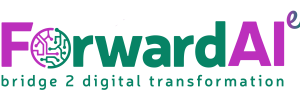Forward AIe Skills project is a comprehensive initiative designed to address the transformative impact of Generative Artificial Intelligence (Generative AI) on education and training across Europe. In a rapidly evolving digital landscape, the project seeks to equip educators, students, and institutions with the necessary skills and tools to harness the potential of AI responsibly and effectively. Aligned with the European Union’s Digital Education Action Plan 2021-2027 (European Commission, 2021), the project emphasizes the importance of digital infrastructure, educator training, and the development of digital competencies to ensure inclusive and equitable access to AI-driven education. The project responds to the critical need to integrate Generative AI responsibly into European education and training, addressing challenges such as ethical concerns, digital divides, and the lack of educator training, while leveraging the significant potential of AI for personalized learning and innovative teaching.
The project aims to foster the ethical, inclusive, and effective adoption of Generative AI across higher education and vocational education and training (VET) systems in Europe. It focuses on building institutional capacity, promoting digital and AI literacy, developing inclusive pedagogical tools, and creating a sustainable ecosystem for responsible AI integration. By enhancing organizational readiness and institutional capacity, the project promotes the ethical, inclusive, and human-centered adoption of Generative AI. It engages a diverse range of participants, including educators, students, policymakers, industry representatives, technology developers, AI experts, ethics researchers, and civil society organizations, through a series of activities such as literature and policy reviews, stakeholder consultations, co-creation workshops, hackathons, and the development of ethical guidelines, training modules, and microcredentials. These activities are designed to foster innovation, collaboration, and the development of AI-driven solutions tailored to educational challenges.
In addition to its focus on formal education, the project will place strong emphasis on lifelong learning, addressing the re-skilling and up-skilling needs of adults through targeted initiatives. By integrating Generative AI into adult education and VET, the project will promote personalized learning pathways, support career transitions, and foster inclusive access to AI literacy for adult learners across Europe. This aligns with the European Skills Agenda (European Skills Agenda, 2025), the Pact for Skills (Homepage of Pact for Skills, 2025), the Council Recommendation on Lifelong Learning (2022), and 20 principles of the European Pillar of Social Rights (2024) reinforcing the project’s impact beyond traditional academic institutions.
Methodologically, the project adopts a participatory, evidence-based approach, combining robust research, user-centered design, and policy-oriented evaluation. It begins with comprehensive research and analysis of existing AI initiatives, including literature reviews, policy analysis, and stakeholder consultations. This is followed by the development of ethical and pedagogical guidelines, AI-powered educational platforms, and scalable tools and resources for education. Partnership will also develop AI-powered educational tools and personalized learning platforms, as well as training modules and microcredentials for educators and learners, supporting capacity building and system-wide readiness. The project then implements pilot projects across diverse educational settings, including universities to validate the effectiveness of the developed tools and methodologies. User experience studies and pilot evaluations ensure that the solutions are practical, effective, and aligned with the needs of educators and learners. Collaborative workshops, hackathons, and transnational events further facilitate knowledge sharing and the dissemination of results.
This approach ensures that the project’s outcomes are both practical and impactful. The anticipated results of the project include a structured analysis of AI best practices in education, a comprehensive set of ethical and pedagogical guidelines, increased understanding of AI deployment challenges, and the adoption of innovative AI-driven teaching methods. The project will produce an European online repository of scalable and transferable solutions, including best practices, digital resources, training content, evaluation frameworks, and evidence-based policy recommendations. These outcomes will contribute to the scalability of AI best practices, enabling broad implementation at the organizational level. The project also aims to enhance AI literacy and workforce readiness, ensuring that educators and learners are equipped with the skills to navigate the AI-driven future. The project will establish clear indicators to monitor the impact of its pilots on learning, equity, institutional transformation, and innovation.
The long-term impact envisioned by Forward AIe Skills is transformative, aiming to significantly enhance digital and AI literacy across Europe’s educational landscape while strengthening the capacity of institutions to adopt and integrate AI responsibly. By fostering a culture of ethical and inclusive AI use, the project will address critical gaps in digital education, ensuring that all learners, regardless of background, have equitable access to the benefits of AI-driven tools and methodologies. This will contribute to the EU’s broader goals of digital transformation, workforce readiness, and sustainable growth, as outlined in frameworks such as DigComp 2.2 (Vuorikari, R., Kluzer, S., & Punie, Y., 2022), the AI Act (European Commission, 2023), and Horizon Europe. Through its evidence-based approach, the project will deliver tangible contributions to European policies, providing actionable recommendations and scalable best practices for the ethical integration of AI in education. By equipping educators and learners with the skills to navigate an AI-driven future, Forward AIe Skills will bridge the gap between the potential of AI and its practical, ethical application in educational settings.
The proposal will also reinforce ethical frameworks for AI use, ensuring transparency, fairness, and human oversight in AI applications, while promoting innovation and productivity in education. Moreover, the project’s focus on inclusivity will help reduce disparities in access to quality education, particularly for underrepresented groups, fostering a more equitable and diverse learning environment. By establishing a sustainable and replicable model for AI integration, Forward AIe Skills will create a lasting impact, enabling educational institutions across Europe to adapt to the evolving digital landscape. Ultimately, the project envisions a future where Generative AI serves as a powerful tool for empowerment, innovation, and inclusivity, positioning Europe as a global leader in the ethical and effective use of AI in education.
This vision aligns with the EU’s commitment to a human-centered digital transformation, ensuring that the benefits of AI are accessible to all and contribute to a more resilient, innovative, and inclusive society.
